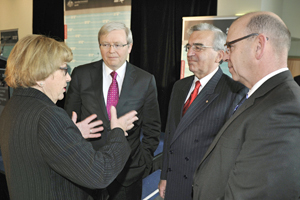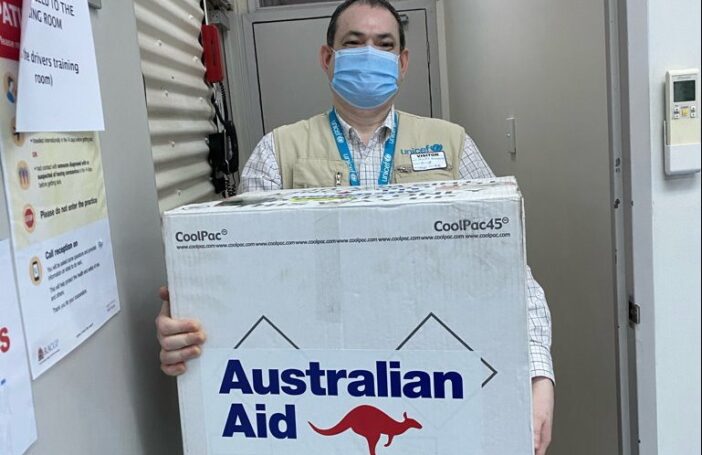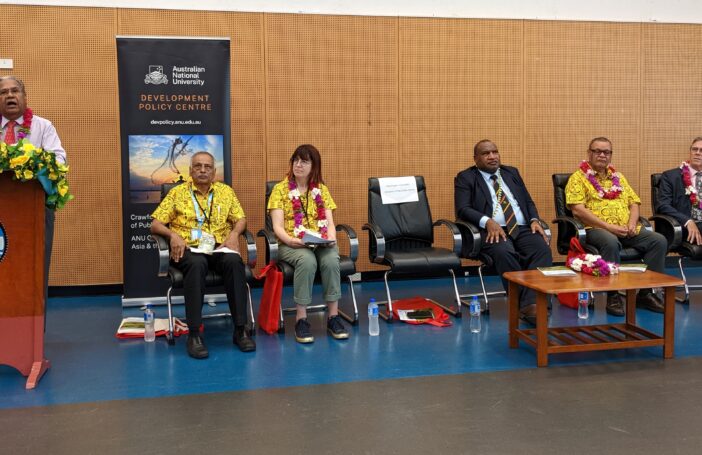On Wednesday 6 July Kevin Rudd (see speech here) released the Independent Review of Aid Effectiveness (available here) and the Australian Government’s response (available here). Its recommendations, and the government responses, are as follows:
1. The objective of the Australian aid program should be cast as follows:
The fundamental objective of Australian aid is to help people overcome poverty. We work to improve the lives of those living in conditions far below what Australians find acceptable. We focus our resources and effort on areas of national interest, and where Australia can make a real difference.
The Government agrees, with the following refinement:
The fundamental purpose of Australian aid is to help people overcome poverty. This also serves Australia’s national interests by promoting stability and prosperity both in our region and beyond. We focus our effort in areas where Australia can make a difference and where our responses can most effectively and efficiently be deployed.
2. Aid allocations to countries and regions should be defined to include the geographic distribution of global programs supported by Australia, as well as country program aid.
The Government agrees to this recommendation.
3. Decisions about country allocations should be defined to include the geographic distribution of global programs supported by Australia, as well as country program aid.
The Government agrees to this recommendation, noting that these will form the criteria in the comprehensive aid policy framework to guide allocations by country/region, sector and program.
4. In scaling up the aid program, country allocations and programs should be adjusted in line with the Review Panel’s specific recommendations based on these criteria.
The Government agrees in principle, noting that specific geographic allocations will be decided by the Government in the 2012-13 budget process. The government also agreed in principle that, in line with ongoing commitments to deliver 0.5 per cent of GNI in overseas aid by 2015-16, aid to Asia-Pacific, South Asia and Africa will be increased, bilateral aid to China and India will be phased out and any future increase in aid to Latin America and the Caribbean will be modest (with any increases to be provided through regional and global programs).
5. Australia should join the African Development Bank.
The Government agrees in principle, subject to the outcome of a detailed assessment
6. The Direct Aid Program should at least double, with the highest increases in countries with no country program.
The Government agrees in principle, with the details to be determined by the Government through the 2012-13 budget process.
7. The aid program should be driven by country programs, rather than by predetermined sectoral targets.
The Government agrees.
8. Sectoral selectivity should be increased at the country level. Sectoral spread in country programs should be low, outside of Indonesia, East Timor, Papua New Guinea and the Pacific island region.
The Government agrees.
9. An organising framework should be adopted to enhance the aid program’s strategic clarity and facilitate communication of results. This should be built around four themes:
- Investing in pro-poor, sustainable economic growth and private sector development
- Promoting opportunities for all
- Supporting social stability, improving the quality of government, and strengthening civil society
- Preparing for and responding to crises.
The Government agrees with one addition, that the framework should be built around five strategic goals:
- Savings lives
- Promoting opportunities for all
- Investing in food security, sustainable economic growth and private sector development
- Supporting security, improving the quality of governance, and strengthening civil society
- Preparing for and responding to disasters and humanitarian crises
10. The aid program should increase its emphasis on private sector development and strengthening civil society. Policy statements in relation to each should be developed.
The Government agrees.
11. Promoting gender equality should be a critical cross-cutting objective for the aid program. Australia should be a firm and persistent advocate and practical supporter of gender equality, especially in the pacific.
The Government agrees.
12. Humanitarian and emergency assistance should be increased as a share of the program.
The Government agrees in principle, with the details to be determined by the Government through the 2012-2013 budget process. Decisions will be based on an assessment of poverty, national interest, capacity to make a difference, and current scale and effectiveness.
13. A small number of flagships should be identified where Australia should exercise leadership and be recognised for its efforts.
The Government agrees.
14. Reliance on bilateral modes of aid delivery should largely be restricted to East Asia, the Pacific, Afghanistan and Pakistan. Aid delivered to other regions should be mainly through partners.
The Government agrees.
15. Core funding to multilateral organisations and NGOs should be significantly increased as a share of total spending. Core funding increases should be made on a case-by-case basis, linked to effectiveness, capacity, and relevance.
The Government agrees in principle, with the details to be determined by the Government through the 2012-2013 budget process. Decisions on allocations will be based on an assessment of poverty, national interest, capacity to make a difference, and current scale and effectiveness in line with their mandate.
16. AusAID should devote greater senior management resources to developing and managing relationships with key partners. Predictable, multi-year funding of partners should be provided and micromanagement avoided.
The Government agrees.
17. Core funding to multilateral organisations should be linked to performance and relevance to Australia through the introduction of a multilateral rating system.
The Government agrees.
18. In relation to multilateral organisations, Australia should use its more prominent ‘seat at the table; to seek greater influence over policy and program directions, better recognition for contributions, and better monitoring of effectiveness.
The Government agrees.
19. AusAID’s existing accreditation system should be used as a basis for Australian NGOs to access increased funding. AusAID should consider further means to improve the accreditation process for small NGOs.
The Government agrees.
20. The share of aid being disbursed through government systems should be expanded.
The Government agrees.
21. The power of business should be harnessed and business innovation should be encouraged, including through an annual consultative forum.
The Government agrees.
22. There should be increased use of partnership arrangements with other bilateral donors, both traditional and non-traditional.
The Government agrees.
23. There should be more aid funding for research by Australian and international institutions, particularly in agriculture and medicine.
The Government agrees in principle, with the details to be determined by the Government through the 2012-13 budget process. Allocations will be based on an assessment of poverty, national interest, capacity to make a difference, and current scale and effectiveness. AusAID will consult with the Australian Research Council and the National Health and Medical Research Council on relevant research.
24. The government should develop and implement a Cabinet-endorsed four-year strategy for the entire aid program, for policy and funding clarity.
The Government agrees. The Government will develop a comprehensive aid policy framework, linked to a four-year budget strategy, which would be a rolling strategy.
25. There should be a Cabinet discussion of an annual review of progress against the four-year strategy and predetermined hurdles, with consequences if hurdles are not met.
The Government agrees, with the following comments:
- An annual review of effectivenss will be presented to Cabinet before the end of each calendar year that will report on
- Whether ODA is being delivered in line with the comprehensive aid policy framework
- Whether ODA is achieving development results
- This will give Cabinet an annual opportunity to changes in priorities, including consequential changes to the comprehensive aid policy framework. This would then feed into the budget process each year through the whole-of-ODA budget submission.
- The annual review will be developed by AusAID in consultation with other agencies
26. The budget process should be reformed to provide greater funding certainty, including allocating funds on the basis of the four-year strategy and its annual updates, not through New Policy Proposals at present.
The Government agrees, with the following comments:
- A comprehensive aid policy framework, which includes a four-year budget strategy, will be developed by Government
- This framework will form the basis of future new policy proposals, which will be brought forward annually in the whole-of-ODA budget submission consistent with whole-of-government budgetary processes
- Improvements to the operation of the ODA Contingency Reserve will be considered before the 2012-2013 Budget.
27. Four-yearly independent reviews of the aid program should be instituted to inform each new four-year strategy.
The Government agrees to regular five-yearly reviews of the aid program.
28. Ministers should continue to provide leadership to the aid program, and particularly the strengthening of the program for the crucial and challenging period of scaling up over the net five years. An effectiveness culture focused on results, rather than an announcement culture leading to fragmentation, should drive the program.
The Government agrees.
29. The words ‘International Development’ should be added to the title of the Minister of Foreign Affairs.
The Government noted the recommendation for further consideration.
30. A ‘whole-of-ODA’ approach should be strengthened by creating uniform standards across government departments to planning, delivery, monitoring and reporting, overseen by the Development Effectiveness Steering Committee (DESC).
The Government agrees.
31. Corporate reform efforts within AusAID should be accelerated to promote a culture geared towards delivering results and enhancing productivity, especially by reducing staff turnover, building the workforce with the requisite skills, streamlining business processes, and reducing paperwork.
The Government agrees.
32. AusAID should be provided with increased resources to manage effectively the increasing program.
The Government agrees in principle, with the details to be determined by the Government through the 2012-2013 budget process.
33. The aid program should foster a culture of risk management rather than risk aversion by balancing various forms of risk and ensuring they are well understood across AusAID as the program grows. It should increase the relative importance of risks to development effectiveness as compared to other risks. There should be a greater focus on results and reward for innovation, and acceptance that in a big program some activities will fail.
The Government agrees.
34. A three-tiered reporting system should be adopted by all Australian government departments and agencies in relation to their use of ODA funds.
The Government agrees. The three tiers of reporting will be:
- Tier 1 – progress against development goals
- Tier 2 – the contribution of Australian aid
- Tier 3 – operational and organisational effectiveness
35. An annual assessment of aid effectiveness of all of ODA should be prepared using the three-tier system. This should inform the annual review of the four-year strategy provided to cabinet.
The Government agrees.
36. A small number of high quality evaluations and an annual synthesis and quality assurance report should be produced annually, overseen by an Independent Evaluation Committee.
The Government agrees.
37. A Transparency Charter should be developed, committing the aid program to publishing documents and data in a way that is comprehensive, accessible and timely.
The Government agrees.
38. Public engagement should be improved through a new community grants scheme, embracing new media technologies and promoting development education.
The Government agrees. The Government will pilot a new community grants scheme that will be delivered through Australian community groups to benefit people in developing countries.
39. The scale-up of the aid program to 0.5 per cent of GNI should be subject to the progressive achievement of predetermined hurdles.
The Government agrees in principle, with program performance to be assessed through the annual review of the aid program noting that development is a long term process and results will be incremental.
To sum up
In all, the Independent Review, according to Kevin Rudd, ‘has found that we have a good aid program and Australia is an effective performer by global standards’. But if Australia is to have, as Minister Rudd announced this morning, ‘the best aid program in the world’, then a lot of work remains. How the Government and AusAID implement these recommendations will be a major determinant of reaching this goal.
Keep watching the Development Policy Blog for more detailed analysis of the Review and the Government’s response in days to come.
Jonathan Pryke is a Researcher at the Development Policy Centre.





